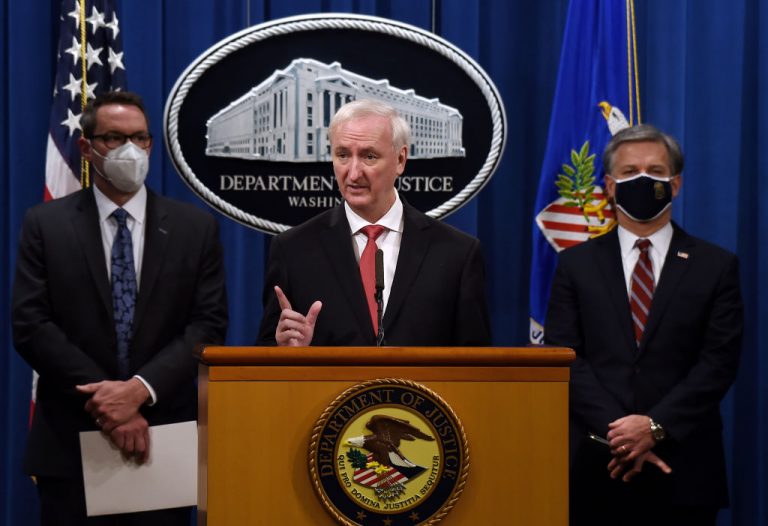On Oct. 26 the U.S. Department of Justice reported the arrests of another 150 people believed to be selling drugs and firearms via the dark web. The announcement follows the successful apprehension of 179 people for the same reasons in September, 2020.
With the help of European authorities, the DOJ was able to seize a sizable portion of drugs, weapons and other illicit goods, valued at approximately 26.7 million euros (US$31 million), the Dutch broadcaster KRO-NRCV reported.
Abyss of the Internet
Kaspersky defines the term “dark web” as the “hidden collective of internet sites only accessible by a specialized web browser.” This sketchy corner of the world wide web has been utilized for private or anonymous online activities, allowing illegal operations to clandestinely run.
Within the deepest and darkest corners of the Internet, these specialized web browsers have no webpage indexing by normal search engines, which makes any content under the dark web very elusive to the majority of users worldwide. “Virtual traffic tunnels” and the lack of coverage by normal web browsers like Google protect the dark web from firewalls and encryption.
The dark web also makes use of “The Onion Routing” (Tor) network browser, which gives users access to sites with the “.onion” URL extension. It functions similarly to a typical web browser, but is able to take random routes through encrypted servers called “nodes,” guiding users to dark web content without being tracked.
Success
You are now signed up for our newsletter
Success
Check your email to complete sign up
As such, the dark web has often been associated with criminal or illegal activities, with “trading sites” set up where people can access and purchase unlawful goods or services.
Online black market
A joint operation codenamed “Operation Dark HunTor” by authorities of both the U.S. and Europe tracked down and hunted almost 150 people linked to the sales of drugs, weapons and other illegal goods.
The operation was focused more towards the sellers and buyers on the darknet, instead of the people behind the sites.
According to the Justice Department, within the 10 months of the operation, authorities were able to take hold of $31 million in cash and cryptocurrency, in addition to 45 guns and 234 kilograms of drugs.
Dutch media also reported that, in addition to 65 U.S. nationals, 47 Germans, 24 Brits as well as Dutch, French, Swiss and Bulgarian nationals were arrested.
Evidence was gathered from previous cybercrime cases, including one concerning an online marketplace called “DarkMarket” that was shut down by German law enforcement after the marketplace’s suspected operators were arrested after entering Denmark. Their servers were confiscated in Ukraine and Moldova.
Investigations into the matter are ongoing.
“We are here today to expose those who seek the shadows of the internet to peddle killer pills worldwide,” said Deputy Attorney General Lisa Monaco adding that, “Thanks to unprecedented international law enforcement cooperation, 150 dark net drug traffickers have been arrested around the world, including 65 right here in the United States.”
Monaco believes that the darknet has been pulling more people than ever before since the outbreak of the COVID-19 pandemic. She also said that the drug trades originate from labs in China before the drugs they produce are sent to Mexico where they begin to spread around the world.
“We know that the precursor chemicals that go into these pills are coming from labs in China and manufactured in Mexico,” she said. “The attorney general was just part of a very significant meeting with three other cabinet officials with meeting with Mexican authorities, and the [Drug Enforcement Agency] (DEA) administrator has also met with the Mexican attorney general and we’ve raised this issue repeatedly.”
Monaco is also hoping that Mexico and China will cooperate with the U.S. in stopping the illegal drug trade.
Administrator Anne Milgram of the DEA said that drug trafficking has increasingly expanded to the digital world, with the darknet being used to sell more dangerous drugs like fentanyl and methamphetamine.
“These drug traffickers are flooding the United States with deadly, fake pills, driving the U.S. overdose crisis, suprring violence, and threatening the safety and health of American communities,” said Milgram. “DEA’s message today is clear: criminal drug networks operating on the Darknet, trying to hide from law enforcement can no longer hide.”
Milgram also stated that the DEA and its allies in the U.S. and other international agencies would continue to hunt down drug networks, including on the darknet.
As shared by the Centers of Disease Control and Prevention, around 70,000 Americans have lost their lives from overdose from opioids in 2020.
While China has faced opioid-related crises like the Opium Wars of the 1800s, the communist-ruled nation has become a prime source of fentanyl entering the U.S. illegal drug market since 2013, as reported by MetroWest Daily News. The opioid crisis that followed stands as one of the U.S.’ biggest challenges in terms of business with China.















